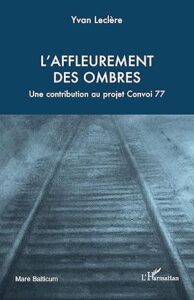BOOKS | FRANCE | LITHUANIA
BOOKS
by Roland Binet (De Panne, Belgium)
◊
◊
 On July 1944, Convoy 77 left the internment camp of Drancy in France, three weeks before the liberation of Paris. The destination was Auschwitz-Birkenau. Eight Litvaks living in France were deported, of whom only one survived the war. The association of the deportees of Convoy 77 would receive the sponsorship of the French Presidency which commissioned schools in France and abroad to research and reconstruct their lives in France and their last days. The project was to “put adolescents in charge not of a sepulchral memory but of the reconstitution of life paths more than death paths.”
On July 1944, Convoy 77 left the internment camp of Drancy in France, three weeks before the liberation of Paris. The destination was Auschwitz-Birkenau. Eight Litvaks living in France were deported, of whom only one survived the war. The association of the deportees of Convoy 77 would receive the sponsorship of the French Presidency which commissioned schools in France and abroad to research and reconstruct their lives in France and their last days. The project was to “put adolescents in charge not of a sepulchral memory but of the reconstitution of life paths more than death paths.”
The project was initiated by a class at the French Lyceum in Vilnius before the Covid-19 epidemic, under the direction of Professor Yvan Leclère, author of a book, Soviet Hegemony. These enthusiastic students began a search on the internet spanning several continents, lasting several years, to piece together why and how these eight Lithuanian Jews had gone to France, how they had lived there and how they came to become ensnared by the Nazis, and finally, sent to their death in Auschwitz. This book can be read as a journal — at times a thriller — that details, sometimes on a daily basis, what progress had been reached in discovering the whereabouts of the eight Lithuanian Jews and also of members of their families who had escaped capture by the Nazis or had been living abroad — and out of danger — at the time these eight were caught.
The last hundred pages are devoted to the rendering in text of the recording of a tribute in literary form to the eight, a form immersed in Jewish lore, with religious and secular illustrations of their lives in Lithuania and in their countries of choice abroad —with France as a last fateful destination. It is a recording of two hours, frame by frame, and with a final mixing, everything coached in a poetical and almost surreal language.
The students and their professor must be commended for their hard work of memory, their thorough research. The French language reader must also admire Leclère’s masterful and erudite French prose, as well as his extraordinary ability to revive Litvak life, in scenes and language.